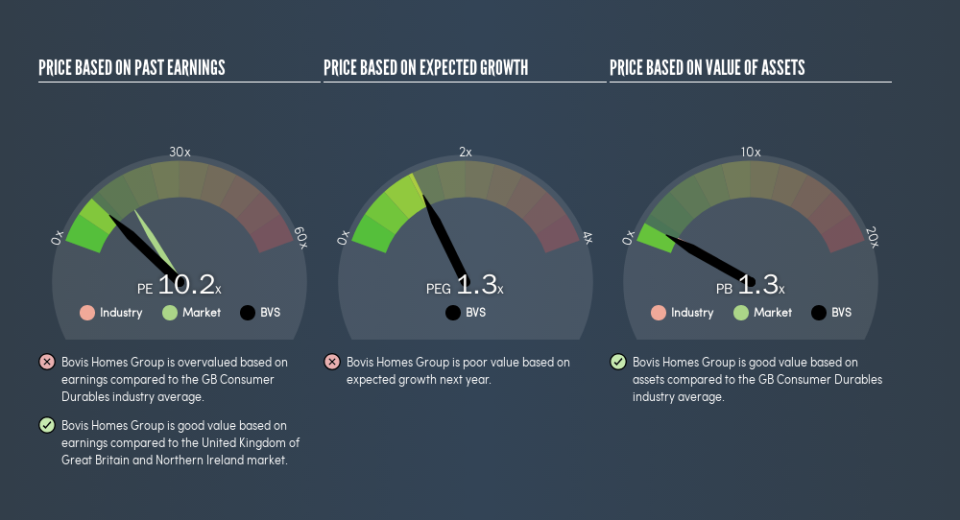Why Bovis Homes Group PLC's (LON:BVS) High P/E Ratio Isn't Necessarily A Bad Thing

Want to participate in a short research study? Help shape the future of investing tools and you could win a $250 gift card!
This article is for investors who would like to improve their understanding of price to earnings ratios (P/E ratios). We'll look at Bovis Homes Group PLC's (LON:BVS) P/E ratio and reflect on what it tells us about the company's share price. Bovis Homes Group has a P/E ratio of 10.16, based on the last twelve months. That means that at current prices, buyers pay £10.16 for every £1 in trailing yearly profits.
See our latest analysis for Bovis Homes Group
How Do You Calculate A P/E Ratio?
The formula for P/E is:
Price to Earnings Ratio = Share Price ÷ Earnings per Share (EPS)
Or for Bovis Homes Group:
P/E of 10.16 = £10.33 ÷ £1.02 (Based on the trailing twelve months to December 2018.)
Is A High Price-to-Earnings Ratio Good?
A higher P/E ratio means that buyers have to pay a higher price for each £1 the company has earned over the last year. That isn't necessarily good or bad, but a high P/E implies relatively high expectations of what a company can achieve in the future.
How Growth Rates Impact P/E Ratios
Probably the most important factor in determining what P/E a company trades on is the earnings growth. That's because companies that grow earnings per share quickly will rapidly increase the 'E' in the equation. That means unless the share price increases, the P/E will reduce in a few years. Then, a lower P/E should attract more buyers, pushing the share price up.
Notably, Bovis Homes Group grew EPS by a whopping 49% in the last year. And its annual EPS growth rate over 5 years is 18%. With that performance, I would expect it to have an above average P/E ratio.
How Does Bovis Homes Group's P/E Ratio Compare To Its Peers?
The P/E ratio indicates whether the market has higher or lower expectations of a company. You can see in the image below that the average P/E (9.9) for companies in the consumer durables industry is roughly the same as Bovis Homes Group's P/E.
Bovis Homes Group's P/E tells us that market participants think its prospects are roughly in line with its industry. The company could surprise by performing better than average, in the future. I would further inform my view by checking insider buying and selling., among other things.
Remember: P/E Ratios Don't Consider The Balance Sheet
Don't forget that the P/E ratio considers market capitalization. In other words, it does not consider any debt or cash that the company may have on the balance sheet. The exact same company would hypothetically deserve a higher P/E ratio if it had a strong balance sheet, than if it had a weak one with lots of debt, because a cashed up company can spend on growth.
Such expenditure might be good or bad, in the long term, but the point here is that the balance sheet is not reflected by this ratio.
How Does Bovis Homes Group's Debt Impact Its P/E Ratio?
Since Bovis Homes Group holds net cash of UK£127m, it can spend on growth, justifying a higher P/E ratio than otherwise.
The Verdict On Bovis Homes Group's P/E Ratio
Bovis Homes Group has a P/E of 10.2. That's below the average in the GB market, which is 16.4. The net cash position gives plenty of options to the business, and the recent improvement in EPS is good to see. One might conclude that the market is a bit pessimistic, given the low P/E ratio. Because analysts are predicting more growth in the future, one might have expected to see a higher P/E ratio. You can taker closer look at the fundamentals, here.
Investors should be looking to buy stocks that the market is wrong about. If the reality for a company is not as bad as the P/E ratio indicates, then the share price should increase as the market realizes this. So this free visual report on analyst forecasts could hold the key to an excellent investment decision.
You might be able to find a better buy than Bovis Homes Group. If you want a selection of possible winners, check out this free list of interesting companies that trade on a P/E below 20 (but have proven they can grow earnings).
We aim to bring you long-term focused research analysis driven by fundamental data. Note that our analysis may not factor in the latest price-sensitive company announcements or qualitative material.
If you spot an error that warrants correction, please contact the editor at editorial-team@simplywallst.com. This article by Simply Wall St is general in nature. It does not constitute a recommendation to buy or sell any stock, and does not take account of your objectives, or your financial situation. Simply Wall St has no position in the stocks mentioned. Thank you for reading.

 Yahoo Finance
Yahoo Finance 
